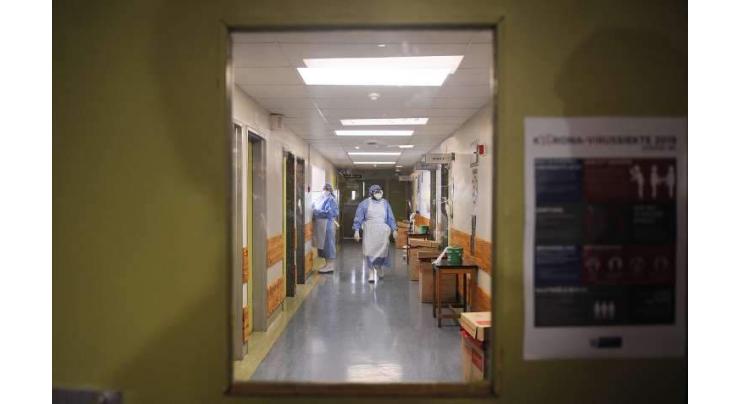
- Home
- Health
- News
- OCHA Says Received 164 Reports on Humanitarian Barriers in Libya Amid COVID-19 Curfews
OCHA Says Received 164 Reports On Humanitarian Barriers In Libya Amid COVID-19 Curfews
Fahad Shabbir (@FahadShabbir) Published March 28, 2020 | 12:47 PM

The United Nations Office for the Coordination of Humanitarian Affairs (OCHA) in Libya has received 164 reports from humanitarian actors about access difficulties brought about by COVID-19 related curfews, OCHA Libya Public Information Officer Jennifer Bose Ratka told Sputnik
MOSCOW (UrduPoint News / Sputnik - 28th March, 2020) The United Nations Office for the Coordination of Humanitarian Affairs (OCHA) in Libya has received 164 reports from humanitarian actors about access difficulties brought about by COVID-19 related curfews, OCHA Libya Public Information Officer Jennifer Bose Ratka told Sputnik.
Libya confirmed its first coronavirus disease case on March 25 in Tripoli.
"Ongoing clashes, along with COVID-19 restriction measures, hamper humanitarian access to those who need assistance and the free movement of medical and other humanitarian personnel in the country. We received 164 reports from various humanitarian actors on access constraints linked with the COVID-19 related curfews being imposed in East, West and South Libya," Ratka said.
�Earlier this week, another international humanitarian agency, the UN Refugee Agency (UNHCR), announced it would suspend some of its operations in Libya, particularly with regard to activities in refugee arrival centers and detention facilities, in light of shortage of personal protective equipment of its staff.
It has sparked concerns within the migrant community in Libya that they would end up cut off from international aid.
"OCHA is not scaling back and our staff is fully engaged, supporting the development of preparedness and response plans, bolstering coordination and providing information management services," Ratka told Sputnik.
She said the agency had taken measures to change the way it operates in line with WHO and national guidelines to minimize the risk of viral transmissions, particularly be adhering to a do-no-harm approach that includes remote coordination by virtual means and increased social distancing on the ground.
"With almost 900,000 people in Libya in need of emergency assistance, we are here to support the response to the pandemic and ensure that we can continue to deliver assistance to the most vulnerable including refugees, migrants and displaced people," Ratka said.
Related Topics
Recent Stories

Empowering women economically crucial for society development: Nilofar Bakhtiar

Fully prepared against West Indies: Sidra Amin

Macron recalls dark side of French WWII history in resistance tribute

Thousands rally in Georgia as parliament debates 'foreign influence' law

Dubai airport diverts flights as 'exceptional weather' hits city

Railways police seek cancellation bail of constable who manhandled woman

Fawad Chaudhry implicated in 40 cases, LHC told

PDMA Punjab ready to deal with series of rains

Row erupts as Brussels orders shutdown of right-wing meet

Russia orders fresh evacuations in Siberia over flood fears

DC directs to enforce newly fixed Roti, Naan rates

LHC suspends victory notification of Rana Arshad from PP-133
More Stories From Health
-

ATC dismisses bail petition of doctor involved in illegal kidneys transplant
7 days ago -

Dr. Shehzad warns against deviation from WHO guidelines on anti-smoking
7 days ago -

Health activists express concerns over attempts to derail tobacco control
9 days ago -

UHS declares MBBS first prof, MS urology exam results
18 days ago -

Increased diagnostic testing for drug resistance
24 days ago -

IRD releases groundbreaking results of end TB programme
26 days ago
-

Increased diagnostic testing for drug resistance TB will enhance patients’ treatment outcome
29 days ago -

JRF to provide insulin to underprivileged diabetic patients
1 month ago -

MBBS third professional annual exams 2023: check results here
1 month ago -

CM Maryam visits PIC, inquiries after patients
1 month ago -

Health expert recommends exercise for weight loss in Ramazan
1 month ago -

Blood camp held at SNGPL office
1 month ago











